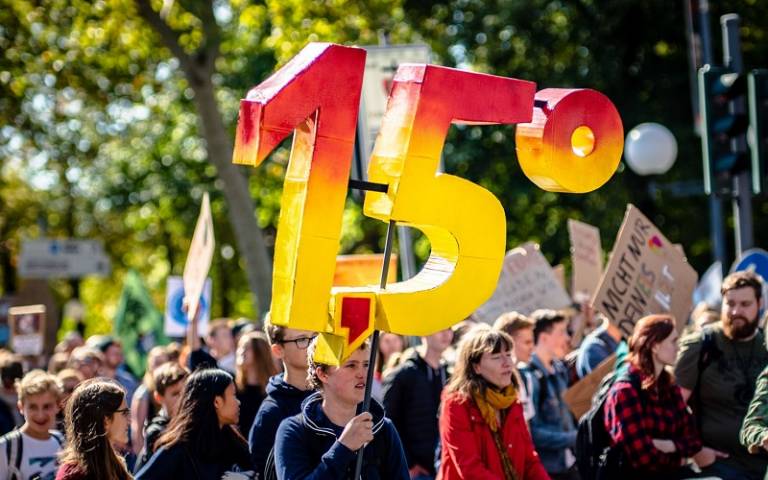Global Climate Change Governance: Driving Systemic Change?
22 January 2020
Julia Kreienkamp (GGI Research Assistant) weighs in on the potential of the Paris Agreement to propel systemic change at multiple scales.

Climate change is increasingly recognised as an emergency. The past five years have been the warmest on record and extreme weather events are becoming more frequent and intense, with severe consequences for ecosystems and human well-being. Although the risk of climate catastrophe is now a top concern for global decision-makers, collective mitigation action is falling dramatically short and efforts to enhance adaptive capacities have only just begun.
More than a classic global collective action problem, climate change is a systemic problem at a planetary scale. Virtually all of us, often unaware, are implicated in its everyday intensification. It is increasingly obvious that traditional global governance tools – focused on top-down, legalised problem solving – will not bring about the ‘rapid and far-reaching’ transformations needed to avoid the worst impacts of climate change. If global governance is to be effective it needs to encourage mitigation and adaptation action by diverse actors at multiple scales and inspire, above all, real institutional change at the domestic level.
The recent Paris Agreement has instilled new hope in this regard. Combining ‘bottom-up’ national target setting with ‘top-down’ oversight procedures, the Agreement turns many long-held assumptions about effective multilateral treaty-making upside down. An unconventional mix of hard, soft and non-law makes it more flexible, dynamic and inclusive than previous climate agreements, enhancing its potential to act as a ‘catalytic core’ within a rapidly growing regime complex. However, time to act is running out and it is unclear whether the Paris Agreement can galvanise enough momentum to drive real systemic change on local, national and regional levels in light of new political headwinds.
An increasingly polycentric regime complex
Years of multilateral gridlock – and the sheer complexity of the challenge, which spills over into many other issue domains – have contributed to the institutional hybridisation and fragmentation of the global climate change regime. As a result, global governance in this domain has evolved from an initially monocentric structure, with the United Nations Framework Convention on Climate Change (UNFCCC) at the top, to a polycentric ‘regime complex’.
The cast of actors within this regime complex has grown significantly over the past two decades. While the UNFCCC continues to serve as a coordinating focal point within UN structures, formal and informal intergovernmental organisations (IGOs) across various issue areas now also address climate change as part of their work, reflecting its linkages with many other global governance concerns, including security, health, migration and poverty (to name but a few). Climate change has also emerged as a priority issue for regional IGOs – such as the EU – which can serve a vital ‘meta-governance’ function, elaborating regional-specific frameworks for the implementation of global goals.
Perhaps the most striking development has been the growing number of collaborative sub- and non-state initiatives, from city networks to business coalitions, transnational activist groups and public-private partnerships. Significantly, many of these initiatives emerge despite, or in response to, a lack of ambitious state action. For example, many American states, cities and businesses have demonstrated continued leadership in light of US withdrawal from the Paris Agreement.
A new playbook: the Paris Agreement
The Paris Agreement reflects a global consensus that all states, in light of their national circumstances, need to step up their mitigation efforts, enhance adaptation action, and align financial flows with a low-carbon pathway. It sets a collective goal to confine global temperature rises to well below 2°C – and ideally 1.5°C – above pre-industrial levels. However, instead of prescribing country-specific targets or policies it asks countries to submit nationally determined contributions (NDCs), outlining their climate goals and strategies. This ‘bottom-up’ architecture is bolstered with ‘top-down’ transparency and stocktaking processes to ensure accountability and enhance ambition.
This shift towards a facilitative (rather than managerial) approach has also entailed an opening of UNFCCC structures to the groundswell of non-state initiatives. Most notably, the Global Climate Action Agenda (GCAA) and the Global Climate Action portal provide new institutional structures to showcase and encourage action by regions, cities, companies, investors and others. The real significance of these initiatives is not merely that they can help fill the emissions gaps left by governments but that they constitute ‘experimental probes’ which may inform policy pathways towards decarbonised and climate resilient societies.
Pathways for global-to-local policy implementation
Ultimately, the success of the Paris Agreement hinges on national preferences for action and sufficient local institutional capacity to encourage innovation and ensure effective policy implementation. Because the Paris Agreement does not establish a strong global compliance regime, national institutions will be crucial to ensure that states stick to their pledges and gradually increase their ambition. A promising development in this regard may be the emergence of independent national advisory bodies across Europe and elsewhere, many of which do not just provide science-based advice on demand but also evaluate ambition levels and progress made on national climate action. The Committee on Climate Change, for example, has shaped policy debates and legislation in the UK, including the new target to reach net zero emissions by 2050.
Yet, unfortunately, recent developments have not instilled much confidence that countries are ready to scale up ambition substantially, build domestic structures for global-to-local policy implementation and tackle the systemic drivers of climate change. The Madrid climate summit in December, which was meant to be a demonstration of increased ambition, ended in disappointment and disarray, with some major emitters actively trying to undermine progress and weaken rules on carbon trading. Meanwhile, the timeframe to address climate change is narrowing quickly. Without radical system-wide decarbonisation measures, a ‘point of no return’ could be reached as early as 2035, after which attainment of the 2°C temperature goal would become extremely unlikely. The deadline to limit warming to the ‘safer’ level of 1.5°C may have been crossed already, highlighting the urgency to move from a discussion framed in terms of emission reductions and offsets to one that centres on the need to disrupt systemic carbon lock-in. The stakes are as high as they get.
 Close
Close


